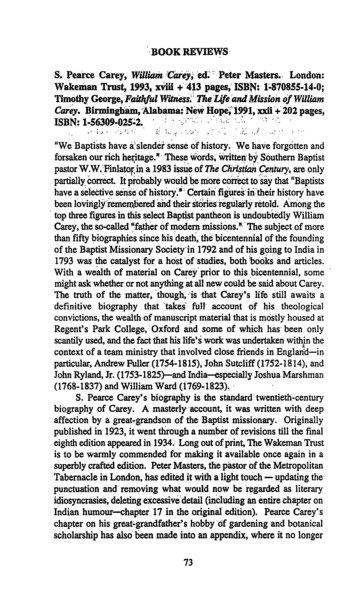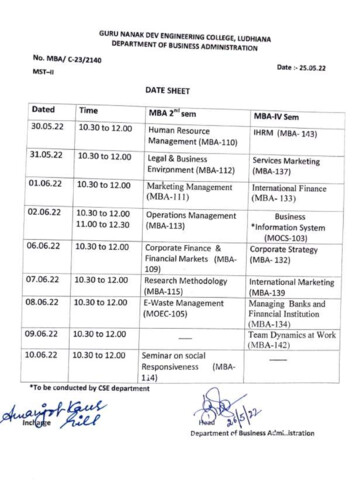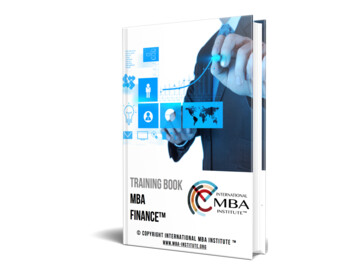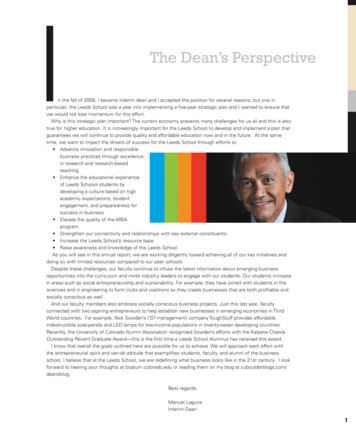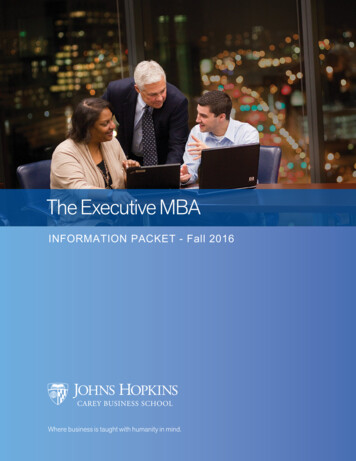
Transcription
The Executive MBAINFORMATION PACKET - Fall 2016Where business is taught with humanity in mind.
PROGRAM OVERVIEWThe Executive MBA program is designed for high-potential senior managers who have extensive work experience intheir professional areas and seek to enrich their academic and professional background with a formal MBA trainingand understanding of the global business setting. This 20-month MBA program is guided by the principle of belief inadaptability, change and growth. The program is delivered in a format that will meet the needs of full-time workingbusiness executives.This unique program has an integrated and strategic emphasis that incorporates many recently-initiatedinnovations in business education at the Johns Hopkins Carey Business School. The curriculum presents businessconcepts in a way that breaks down traditional functional silos and promotes more integrated framing of businessissues. Each course stresses practical application of concepts through examples, case studies, and best-practicepresentations (from specially selected practitioners) that highlight how the most innovative firms are addressingthe complex challenges of a rapidly globalizing world economy.Beyond courses that cover core business concepts, the curriculum features special topics sessions and advancedseminar courses to give students a sophisticated grasp of contemporary regional and globally relevant businesspractice. MBA candidates work in teams on course assignments during the residential sessions.The candidates for the Executive MBA program are drawn from around the world and are connected by a commondesire to accelerate their careers into the top ranks of their companies. Students are selected and recommendedby their companies, which will demonstrate a strong support and commitment to MBA candidates’ professionalgrowth and investment of their time and energy to complete the program requirements.Benefits of the Executive MBA program Small scale and interactive settingCohort-based programOpportunity to immediately apply newly acquired academic and applied knowledge tostudents’ work environmentIntegrated approach and rigourous coverage of key business conceptsFocus on group projectsLeadership and professional development coursesTarget Group Minimum 7-10 years of professional experienceDemonstrated management experience and leadership skills (leading projects and teams)Diverse professional, academic, and geographical backgrounds
Program structure 54 credits; total length: 20 months and program starts in the Fall semester, September 2016.The program consists of 9 residencies, including:- Orientation Weekend (August 12-14, 2016 in Baltimore, MD)- 8 week-long residencies (7 days each) in Baltimore, MD with a combination of on-site and distance learningfor certain components of the courses- 1 international residency (8 days) Residencies take place approximately every 2 months.Prior to each residency, students receive a reading package with pre-module homework, case studies, andexercises that they are required to complete for partial credit toward the next residency.Post-residency work will consist of case studies and take-home exams that students complete in order toreceive full credit for the residency work. Admissions Criteria/ Requirements Application (online)EssayTranscript(s)- Course-by-course credentialing (required for all international degrees)2 letters of recommendation, including:- Recommendation from current supervisorResumeGMAT (NOT required; but must request waiver with supporting explanation)TOEFL (required for international students; or must request waiver with supporting explanation)Application deadlines:o Priority – January 11, 2016o Standard – March 29, 2016o Final – May 2, 2016Total Program Fee: 118,900 for cohort starting Fall 2015; tuition for Fall 2016 will be announced in Spring 2016Program fees include: Program fees do not include:Tuition fees Travel to and from residenciesAccess to all online courses Dinners at each residency Airfare for international residencyAll registration and graduation feesTextbooks, required reading materials, case studiesLodging at all domestic residencies(hotel accommodations, breakfast, lunch)Lodging at international residency (hotel accommodations, breakfast, lunch)For information on admissions requirements and other questions, please contact:Bruce Campbell – Director of AdmissionsPhone: (410) 234-9325 Email: bruce.campbell@jhu.edu Web: www.carey.jhu.edu/emba
EXECUTIVE MBA PROGRAMRESIDENCY CALENDAR: 2016 – 2018Orientation WeekendInternational ResidencyExecutive MBA 2018 71421281815222929162330OCTOBER2391016 1723 2430 1522292916233031NOVEMBER6132027SMTWTFSAUGUST17814 1521 21281815222929162330310172431SMTWTFSAPRIL2391016 1723 16233031017243141118255121926DECEMBER34510 11 1217 18 1924 25 5 1622 2329 212818152229SMTWTFSJANUARY1278914 15 1621 22 2328 29 1825512192641118255121926OCTOBER128915 1622 2329 L128915 1622 2329 29291623303101724314111825AUGUST51219266132027
EXECUTIVE COACHINGCarey is among the first schools that recognized the need to provide Executive Coaching to Executive MBA candidates, to help themidentify and explore specific goals for their professional and leadership development.We adopted the belief that everyone is a leader, by choice or default. The role of the coach is to identify strengths and move clientsthrough challenges, which get in the way of their natural leadership. A coach understands what it takes to seamlessly integrate theschool experience with the career transition, acceleration, or transformation process.“The bottom line is that Johns Hopkins Carey Business School cares deeply about every student’s career development and success,” saidOksana Carlson, Assistant Dean of Education at Carey. “This is just one more asset we provide enabling our students to be positionedto lead while developing a strong sense of ethical consideration and a global perspective, equipping them to tackle complex businessenvironments.”Why Executive Coaching?Executive Coaching is an extraordinary crucible for leadership development with a particular focus on helping leaders developmindfulness, agility and resilience, which is absolutely essential in today’s demanding environment. We strive to have individuals walkaway from coaching with a set of practices that allow them to respond, rather than react, to the challenges they face as highlysuccessful business leaders. These mindfulness and reflection practices can also help leaders relieve stress, develop patience withthemselves and others, and enhance focus and concentration on the things that “really” matter to them as individuals and to theorganizations they lead.How does Executive Coaching work?The Executive Coaching program starts with the group session to set the stage and build the framework for future activities andinteraction with Executive Coaches. We engage 5-10 coaches who are certified career and leadership coaches specializing in coachingsenior executives from industry, government, and non-profit sectors. Each Executive MBA student receives 9 sessions throughout theprogram in a thought-provoking partnership designed to inspire and support students and maximize their professional potential.Through a combination of individual coaching, group facilitation, and comprehensive assessment tools, students experience clarity,direction, and purpose as they address their most pressing issues – professionally and beyond.The coach serves as a facilitator to help you attain your full potential as a leader. The emphasis is not on the past but on the futureand its relevance in guiding present thoughts and actions.What topics do EMBA students focus on, in Executive Coaching? Leadership: your primary leadership style, how to expand/ incorporate variety of leadership approachesBuilding effective teams: working within and across departmentsMotivation, reward, retention of your staffRe-positioning yourself in your industryMaking a career change or entering a new industry: risks and opportunitiesManaging the Board; serving on the BoardThe goals for Executive Coaching: To aid you, as a transformative leader, in developing mastery of your career, achieving professional success, and ascending to thenext level within your organizationTo help you receive constructive feedback in a supportive environment and concrete action plan for continuing your developmentas a leader – and getting results in your organizationTo give you time to reflect on your coursework and sharpen your awareness of your own unique leadership skills and abilitiesTo help you become more acutely aware of your impact on others and managing relationships up and down the organization
EXECUTIVE MBA PROGRAMPROGRAM OUTLINE & COURSE DESCRIPTIONS: 2016 – sCourse Starts:July 24, 2016August 12–14, 2015(Baltimore, MD)Modules / CoursesStatistical Analysis (onsite & online) required for EMBA students Course dates: July 24 – September 25, 2015 Access via: blackboard.jhu.eduOrientation for new EMBA students (required) Opening Session & Welcome Program Logistics & Academic Overview Student Services, Systems & Resources Leadership Academy Statistical Analysis SessionCreditsOnsiteOnlineP/FP/FXStatistical Analysis Final ExamPre-residency: Aug 17–Sep 171Onsite: Sep 18–25, 2016 Postresidency: Sep 26–Oct 13Innovative Leadership2Analyzing Financial Statements & Managing FinancialResources3Microeconomic Foundations of Managerial Decisions2Pre-residency: Oct 14–Nov 12Microeconomic Foundations of Managerial Decisions2Onsite: Nov 13–20, 2016 Post-Statistical & Behavioral Foundations of ManagerialDecisions2Leading Marketing Strategy2Accessing Capital Markets2Managing Operations2residency: Nov 21–Dec 15Pre-residency: Jan 19–Feb 183Onsite: Feb 19–26, 2017Post-residency: Feb 27–Mar 16Leading Technology CommercializationBusiness Negotiations In & Between CulturesPre-residency: Mar 17–Apr 224Onsite: Apr 23–30, 2017Post-residency: May 1–May 13Business Negotiations In & Between Cultures2Leading Creativity2Strategically Managing Human Resources2Leading Technology CommercializationP/F1
EXECUTIVE MBA PROGRAMPROGRAM OUTLINE & COURSE DESCRIPTIONS: 2016 – 2018ResidencyDatesModules / CoursesCreditsOnsitePre-residency: May 27–Jun 245Onsite: Jun 25–Jul 2, 2017Post-residency: Jul 3–July 25Pre-residency: Aug 15–Sep 963(T&D) Ethical Leadership1Leading Organizational Change2Advanced Financial Management & Innovation2Innovating Business in Emerging MarketsP/FInnovating Business in Emerging Markets4Onsite: Sep 10–17, 2017Post-residency: Sep 18–Oct 11Pre-residency: Oct 12–Nov 47Leading Technology CommercializationOnsite: Nov 5–12, 2017Post-residency: Nov 13–Dec 13Leading with Business IntelligencePre-residency: Jan 17–Feb 10Onsite: Feb 11–18, 2018Post-residency: Feb 19–Mar 152International Finance2Business to Business Marketing2(T&D) Corporate Governance1Strategic Capstone8OnlineP/FCompeting in iMarkets2Leading Complex Projects2(T&D) Managing Risk, Decision Making & Accountability1Strategic CapstonePre-residency: Mar 16–Apr 149Onsite: Apr 15–22, 2018Post-residency: Apr 23–May 12Leading Entrepreneurship & Innovation2Anticipating & Responding to Crisis2Strategic Capstone31504TOTAL54Each onsite course may include 4-12 hours of online class sessions, twice a week in the evenings during the pre & post residency coursework periodCourse listings and descriptions are subject to changeMay 16, 2018 (TBD)May 18, 2018 (TBD)Carey Graduation CeremonyUniversity-wide Commencement
COURSE DESCRIPTIONSStatistical Analysis (Robeson)The course covers descriptive statistics, probability, discrete and continuous distributions, hypothesis testing and estimation,regression, forecasting and statistical process control. The course emphasizes statistics to solve management problems.Useful Excel spreadsheet functions and their applications will be discussed on many topics. (Pass/Fail)Innovative Leadership (Calvin)The goal of this course is to help the executive use organizational behavior theory to enhance leadership skills. Specifically,this course seeks to provide the analytical frameworks and the practical experience necessary to better influence and leadindividuals and groups in organizations. A fundamental assumption underlying the course is that leadership is both art andscience. The analytical frameworks will help the executive understand leadership; the practical experience will help you putthat understanding into action. Key leadership tasks require the executive to manage people, information, and processes toaccomplish organizational goals, often under conditions that are not of her own choosing. The successful execution of thesegoals requires the executive to harness the psychology of individuals and groups, in order to motivate others to act. Whilethe course acknowledges that some people are “born leaders,” it assumes that most people learn how to lead throughsustained analysis and practice. (2 credits)Analyzing Financial Statements & Managing Financial Resources (Bandi)The interpretation of financial information and the process of choosing between competing investment opportunities (capitalbudgeting) are fundamental facets of management. The allocation of resources on the part of investors, creditors, andinternal managers hinges crucially on the availability of reliable and timely information about a firm’s financial position, riskand profitability. Understanding the basics of financial statement analysis - and its interpretation - is, therefore, an importantaspect of the process of allocating resources to a firm and to projects within a firm. Once the firm’s financial position isunderstood, the decision as to whether a new project should be undertaken, possibly among a menu of alternative availableprojects, defines the process of capital budgeting. Contrary to financial statement analysis, capital budgeting is a forwardlooking operation which requires accurate estimates of the future revenues and costs associated with competing projects,estimates of the projects’ future cash flows, and careful sensitivity analysis of these estimates to changes in the initialassumptions. The goal is, of course, to choose the best investment opportunity among those that are available. Doing so inan uncertain environment requires care. (3 credits)Microeconomic Foundations of Managerial Decisions (Frick)This course addresses the normative principles relevant for managerial decision-making and a set of spreadsheet tools tohelp make the relevant managerial decisions. The course addresses core topics in managerial economics and managementscience and introduces microeconomic principles and analytical methods underlying key managerial decisions. We use casesand experiential exercises to examine how these influences may be managed to enhance the quality and effectiveness ofmanagerial decisions. (3 credits)Statistical & Behavioral Foundations of Managerial Decisions (Chakravarti)This 2-part course addresses the normative and behavioral principles relevant for managerial decision-making. Residency 2introduces how principles of classical and Bayesian statistical analysis are used to account for the uncertainty and risk that isinherent in managerial decision- making. Finally the course examines behavioral principles and shows how the normativetenets of decision-making are often systematically influenced by managerial cognitive capabilities, motivational andemotional states, and socio-cultural factors. We use cases and experiential exercises to examine how these influences maybe managed to enhance the quality and effectiveness of managerial decisions. (2 credits)Leading Marketing Strategy (Yang)This course provides executives an in-depth understanding of marketing strategy. It is designed to help executives experiencethe role of senior business executives in formulating, implementing, and evaluating marketing strategies for a wide variety ofcomplex real-world business scenarios. Executives will analyze and learn the key factors underlying successful and lacklustermarketing strategies of both major corporations and smaller firms, across different industries, across different tiers of brands,and across the globe. Through case analyses, in-class discussions, course assignments, and a research project, executives willdive into topics such as industry and market analyses, dynamics of competition, value creation, branding, segmentation,targeting, positioning, product development, pricing, distribution, and promotion. (2 credits)
Accessing Capital Markets (Colantuoni)Capital market securities, and the bond and stock markets in which they are traded, represent a critical source of long termfinancing for corporations in the global economy. These securities also offer individuals and institutions opportunities toinvest funds over extended time horizons and obtain a wide range of possible returns for given levels of risk. The capitalmarkets provide companies with an equally wide range of financing options to fund large scale investment projects necessaryfor future growth. This course will cover two general categories of capital markets: fixed income and equities. We will exploredifferent types of each instrument and what characteristic benefits each source of financing provides. A number of differentfixed income products will be covered with an emphasis on understanding basic valuation techniques, contract design, andmarket mechanics. These are important concepts to understand when participating in the capital markets arena andsuccessful managers should have a basic working knowledge of the capital market financing options. This course will alsobriefly review associated capital market derivative instruments. (2 credits)Managing Operations (Sahin)Advances in communication and information technologies have had far-reaching impact on markets, organizations and themeans of producing services and products. This course will address how business processes can be deployed strategically bycorporations to drive outcomes in markets. The nearly instantaneous transmission of rich information across the boundariesof the corporation and across geographical boundaries has far-reaching implications for the design and operation of businessprocesses. Business processes can now span multiple organizations and connect corporations, consumers and supplierstogether in highly connected ecosystems that comprise of multiple supply chain and value chain players. This course willexplore the strategic use of business processes by corporations and also address how companies can achieve specific aspectsof operational excellence by linking business processes back to companies’ market-facing strategies. (2 credits)Leading Technology Commercialization (Gordon)The focus of this course is the commercialization of technological discoveries: tangible products like compounds, drugs ordevices as well as intangible co-products or “know-how.” This course covers the concepts and organizational issues involvedin selecting an invention or discovery and converting it to a viable business. This course enables the executive to recognizeand screen technology opportunities. Executives will learn the ins and outs of intellectual property creation, protection, saleand acquisition, how to license technology from and to others to create diverse revenue streams. Largely focusing onbiotechnology inventions and discoveries originating in universities, the course covers the ownership of the invention,protecting the intellectual property, forming a company, overcoming regulatory hurdles, and other related issues commonto this type of enterprise. Particular attention will be paid to economic issues ranging from when and how to raise initialcapital to strategies to harvest the profits. (3 credits)Business Negotiations In & Between Cultures (Lee)We negotiate every day – with employers, coworkers, bosses, spouses, merchants, service providers, and others. Negotiationis the art and science of securing agreements between two or more parties, who are interdependent and seeking to maximizetheir outcomes. This course will provide the executive with the basic knowledge and applied skills to negotiate in a wide arrayof settings. The first part of the course focuses on the fundamentals of negotiation—understanding, preparing for, andexecuting increasingly complex negotiations in any culture. The second part of the course extends these basic principlesacross cultures, focusing on the challenges and opportunities faced by negotiators working across national boundaries. Wewill develop our negotiation skills in a series of simulations and feedback sessions. Together, we will engage in a variety ofbargaining processes that span the contexts of deal-making and dispute resolution. Each simulation has been chosen tohighlight the central concepts that underlie negotiation strategy. While a leader needs analytical skills to develop optimalsolutions to problems, a broad array of negotiation skills is needed to get solutions accepted and implemented. (2 credits)Leading Creativity (Kim)This course explores various ways that leaders can cultivate creativity utilizing findings from empirical research inorganizational behavior and social psychology. It seeks to increase participants’ understanding of the psychology of individualand group creativity as well as recognize some of the common barriers to creative problem solving at work. Executives willevaluate their current approaches to leading for creativity as well as brainstorm ways to facilitate greater creativity withintheir organizations. This course will be taught as a hybrid seminar and workshop and will include hands-on activities designedto help leaders improve their problem solving ability as well as help them promote these skills in others. (2 credits)
Strategically Managing Human Resources (Macis)Developing and managing human capital is vital for the success of any organization. In this course, we will examine ways inwhich Human Resources Management can be used to enhance organizations’ competitive capabilities. The goal will be tounderstand how an organization can select, train and retain the right employees, and how it can effectively motivate themto make decisions that will allow the organization to successfully implement its overall strategy. We will explore and mastertopics such as hiring and layoff decisions, human capital and on-the-job training, turnover, the provision of incentives, theadvantages and disadvantages of alternative compensation schemes, objective and subjective performance evaluation,relative performance evaluation, promotions and other career-based incentive schemes, team production and teamincentives, stock options and executive compensation, intrinsic and extrinsic motivation, non-monetary compensation andemployee benefits. (2 credits)Discourses in Ethical Leadership (Helzer)This seminar is a highly interactive learning experience focusing on the ethical challenges of business in a complex, globalsociety. The goal of the course is to enable executives to build a framework for high-stakes decision-making in a dynamicglobal context of competing value claims. Throughout the seminar, executives will explore the architecture of human valuesfrom various dimensions: personal, organizational, societal, cultural, and cross-cultural. Executives will examine a variety ofcomplex scenarios and cases they may encounter in a business career. Executives will learn from each other as they explore,discuss, and debate ideas and values. Building on personal values, the seminar provides the opportunity for executives tocultivate skills and dispositions of self-awareness, critical thinking, collaborative inquiry, dialogue, discernment, and decisionmaking that will foster their effectiveness as a leader. (1 credit)Leading Organizational Change (Sutcliffe)A core leadership challenge is strategically, efficiently and fluidly guiding others through the stages of organizational change.Change is an important aspect of life for people, groups, and especially organizations. Change is ever more important as we,and the organizations in which we work, face multiple and shifting imperatives. Change efforts often fail, or we somehowmuddle through change satisfactorily. Yet, we can improve our success if we apply frameworks, techniques, and perspectivesthat elevate our abilities beyond the common sense level of performance. We do this by analyzing the forces that driveorganizations to change, examining impediments to change, and surveying approaches for making organizational changemore effective. The concepts and tools learned in the course will be brought to life during this course using an interactivesimulation. This provides the opportunity to demonstrate and improve your ability to manage change in a dynamic,competitive, and complex environment. Teams will formulate a change strategy and then will enact the change and evaluatethe results of your decisions. A pre/post comparison will allow you to empirically validate your learnings. (2 credits)Advanced Financial Management & Innovation (Barreiro)In a low global growth, highly uncertain environment, business executives are increasingly selective on how they approachthe allocation of firm resources. This course focuses on the practical elements of allocating resources from three diverseperspectives: corporate finance executive, equity analyst, and investment asset allocator. In the first section, we will view theworld from a corporate finance executive, capital budgeting strategy lens. Using a simulation, participants must select amonga diverse range of projects. In part two, we transition to a business valuation perspective on how an equity analyst evaluatesindustry positioning, key business performance drivers and models perceived stock value. In part three, we assume aninvestment perspective in determining how to construct a global asset allocation model. Throughout the course, executiveswill be expressing views, developing models, and arriving at a recommendation that combines data and high convictionqualitative views. (2 credits)Innovating Business in Emerging Markets (Phan)Innovating Business in Emerging Markets draws upon the disciplinary knowledge and qualitative/quantitative analysis skillsacquired in the Executive MBA program to provide a learning experience focused on the challenges of building sustainable,impactful businesses in emerging global marketplaces. The course aims to create in each student an appreciation ofopportunities in critical sectors of human need in these complex, resource-constrained markets that are plagued byfragmented infrastructure. Students will learn first-hand how businesses serving these needs contribute to communitydevelopment and ‘do well by doing good.’ Success in the course requires students to work effectively in collaborative teams,communicate with sponsors and partners in distant global markets to scope a business project, and function adaptively tomeet project goals in new and unstructured environments. (4 credits)
Leading with Business Intelligence (Lim)This course, which is delivered online, introduces a set of fundamental principles and a framework that guide extractingbusiness insights from data to generate competitive advantage. A key objective of the course is to provide executives withbusiness intelligence toolkits for solving business problems and to critically evaluate business intelligence projects. Thelessons and exercises include understanding and visualizing the data, applying analytical frameworks and methods, andevaluating business intelligence projects with business goals in mind. Executives will apply these techniques in hands-onexercises using software, R. (2 credits)International Finance (Rebucci)This course covers issues related to doing business in the global environment, international financial markets, andinternational financial management. The first part of the course covers the basic macroeconomic and financial linkagesbetween national economies. The second part of the course focuses on the foreign exchange market, the international moneymarkets, and the conditions that define their interrelation. The third part of the course considers issues associated with theoperation of a firm in the global environment, including particularly exchange rate risk management, the opportunities andchallenges offered by international capital markets and project evaluation/financing in the international context. (2 credits)Business to Business Marketing (
The Executive MBA program is designed for high-potential senior managers who have extensive work experience in their professional areas and seek to enrich their academic and professional background with a formal MBA training and understanding of the global business setting. This 20-month MBA program is guided by the principle of belief in


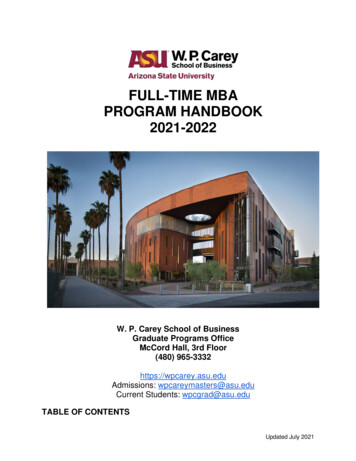
![Welcome [carey.jhu.edu]](/img/15/gmba-welcome-packet-class-2020.jpg)
